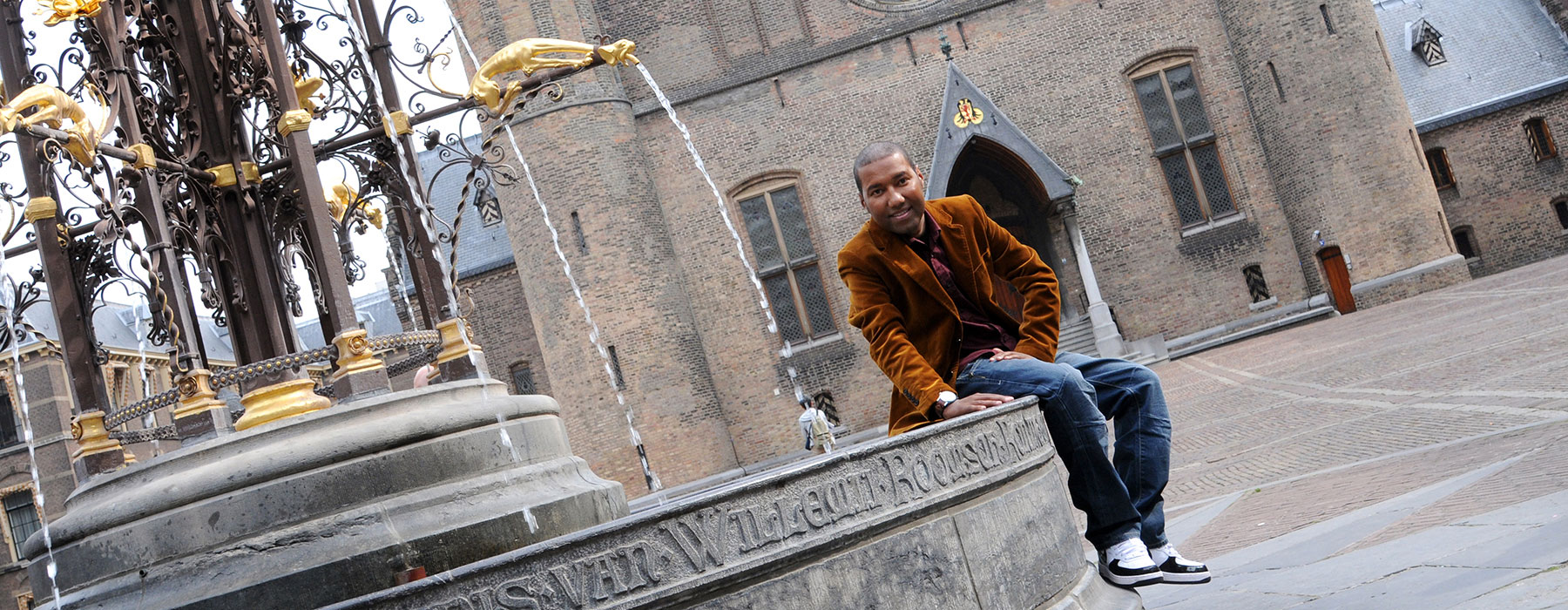NAME: OMAR MUNIE
COMPANY: OMAR MUNIE CLOTHING
IN THE NETHERLANDS SINCE: 1994
Somali Omar Munie was keen to differentiate himself from other students at fashion design school. So he chose to design handbags instead of garments. An inspired choice, as it turned out! He describes himself as a ‘cautious’ entrepreneur, but lost no time in opening a flagship store on the Coolsingel in Rotterdam, in 2010. The shop has recently moved to Noordeinde, in The Hague. Omar is a real craftsman, implementing his plans step by step rather than taking a bank loan. He makes do on a very modest income – to him luxury lies in the challenges of entrepreneurship and in inspiration for new designs. He also gives lectures and workshops and has authored Live your dream, a book that he hopes will motivate secondary school pupils. His handbags are gaining ground as the perfect combination of form and function. So it’s no surprise that many celebrities have discovered his shop.
1. How long have you been in The Netherlands?
Since December 1994, when I was nine years old.
2. How did you become an entrepreneur and why?
Everyone was into garment design at the fashion school, but I wanted to do something different. I decided to make handbags and found an immediate market among my classmates. My first handbag was priced at 35 euros. During my training I set up Omar Munie Clothing. A few years ago I went to New York with my then girlfriend and decided to take a few handbags with me. While my girlfriend was being made up in a department store, one of the make-up artists commented on my handbag. When I responded that I had made it myself she immediately called her colleagues and in no time I had sold all the bags I had – which paid for my airline ticket! Although I am a cautious entrepreneur and have never taken a bank loan, I immediately opened a flagship store on the Coolsingel, in Rotterdam. Thanks to the help of fellow designers and high school students the shop was fitted out for a low budget, but has an upmarket image due to the quality of the handbags and the high level of customer service and attention it offers. Each bag is unique – and handmade in The Netherlands. I am keen to stay close to the production process and have deliberately chosen for exclusivity. My approach is to build the business step by step. What’s important to me is the craft, the fact that it’s a totally Dutch product. I’m not exactly a big spender. Luxury, for me, is the challenge of entrepreneurship – a lot of looking around for inspiration and always trying to create new designs. As a result of my success I now also give lectures and organise workshops and high teas at my studio in The Hague. I have also written a book, as I hope that my story will encourage a lot of secondary school pupils.
3. Did you encounter problems when you wanted to become an entrepreneur?
As an entrepreneur you’ll always come across obstacles, but I always think of them as challenges that motivate me to try even harder. After winning the presidential elections Obama said: ‘If you can make it in America, you can make it anywhere.’ I think you can make it anywhere – if you want to.
4. What are the differences between doing business in The Netherlands and in Somalia?
The Dutch deliver on their promises and are very clear, but they do want to put everything on paper. Blind confidence is something they avoid. ‘The cheaper the better’ applies in Somalia: The Dutch are more interested in quality, while Somalis never want to spend a lot of money. So my mother never carries one of my handbags, however proud she may be of me. In her opinion they are, ‘Much too expensive, and unnecessary’.
5. What is typically Dutch when it comes to doing business and being an entrepreneur?
In my view the Dutch could be a lot more service-oriented and hospitable. I pay a lot of attention to this in my shops. Americans, for example, are a lot better at it.
6. What have you taken from both the Dutch and Somali cultures?
From Dutch culture: being punctual. And I still go to my mother’s every evening to eat Somali food. No-one cooks it better! That’s really an important thing I’ve taken from Somali culture. However, I’m at home in both cultures. Even though they differ greatly they are both very special to me.
7. Would you ever go back to Somalia?
As long as things remain unsettled there I won’t go back – however regrettable that is.
8. What are the secrets of your success?
Cherish the craft: all my handiwork has a personal touch. My customers buy much more than a handbag. They buy an emotion, an experience. It’s something that you always have with you. The involvement of my family is also very valuable to me: four of my five brothers work in the business.
9. What is your favourite fruit, and why?
Apples.
10. What is your favourite Dutch product and/or place?
My favourite Dutch product is a herring sandwich and The Hague is my favourite place, because of the new shop and the production that takes place there.
TIPS from Omar
1. Persevere and work just that little bit harder
2. First look around you and see what others are doing
3. Immerse yourself in the mindset, remember the goodwill factor
4. Learn to deal with people on the spot
5. Accept that taxes are high in The Netherlands. Be generous
6. ‘Honesty is the best policy’
